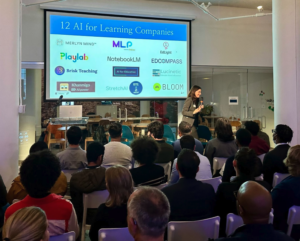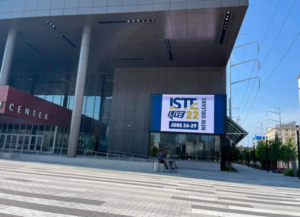Advancing AI Through Equity and Access
Key Points
-
HBCUs like Morehouse College are pioneering equitable AI education through initiatives like Metaversity to empower underserved communities.
-
Schools, organizations, and tech companies must prioritize inclusive design and accessibility to bridge the AI literacy gap and ensure equitable benefits.

During a panel discussion at the June 26 International Society for Technology in Education conference. Leah Austin, president and CEO of the National Black Child Development Institute, urged educators and tech leaders to strike a balance between ensuring everyone has access to emerging technologies and protecting them from the dangers of tools that were not designed with them in mind.
According to experts, the increasing use of AI tools threatens to exacerbate long-standing race and equity issues, such as racial bias in lessons and grading, over-discipline of Black boys, continued under-resourcing of majority-minority schools, and the “digital divide” between Black students and their white peers. Generative AI has the potential to increase the racial and economic disparities in the United States by $43 billion each year. However, when used properly, it has the potential to erase barriers to Black economic mobility. “We already know about the bias issues with AI,” says Victor Lee, an associate professor at Stanford University’s Graduate School of Education. According to Lee, the possibility of technologically induced prejudice “is quite high for schools to jump in too quickly.”
“Oftentimes tech companies didn’t seem to understand the experience of Black and Brown students in the classroom,” Nidhi Hebbar, co-founder of the EdTech Equity Project, told The Hechinger Report in 2023. The EdTech Equity Project assists schools in selecting equitable edtech products and holds corporations accountable for technologies that lack inclusion.
“When software companies create tools for schools, they collaborate with affluent, predominantly white schools or draw on their own educational background, Hebbar explained. Their designers, she claims, frequently ignore or struggle to imagine the needs and experiences of underserved schools and Black children.”
This includes AI classroom modules that ignore Black history or fail to account for cultural differences in tutoring classes or examinations, according to experts. They argue that over-reliance on software systems in schools might lead to misidentification of problematic pupils, failure to interpret cultural references in an essay, or pointing to non-existent problems.
HBCUs, such as Morehouse College, have begun to integrate AI in an equitable and accessible manner for their students. I had the pleasure of speaking with Dr. Muhsinah Morris about the implementation of AI at Morehouse and in communities of color.
Morehouse Metaversity’s Approach to AI Equity and Access
For Morehouse College, piloting artificial intelligence in academics began in the spring of 2021, when Dr. Muhsinah Morris and three other professors spearheaded the use of immersive virtual reality as a teaching modality amid the challenges of distance learning during the COVID-19 pandemic.
What initially started as a pilot project to ensure matriculation soon became the blueprint for the nation’s first “Metaversity” virtual reality experience, now followed by more than 120 existing “Metaverses” in historically Black colleges and universities across the country.
Now, through the collaborative efforts of VictoryXR and OpenAI, Morehouse is continuing to forge paths in technology education by implementing AI teaching assistants and textbook assistance in multiple disciplines. “Innovation is the only way that I can see that you overcome 20 generations of inequity,” Morris explained. “If we don’t continue to innovate and springboard off of the thing that is available to us right now, we will keep ourselves down as a community.” Morris later said, “Many in our communities do not understand the way in which AI will change the way they live, work, play, and become educated. It is unfortunate because it has become a trending topic rather than a subject/discipline to understand. However, the lack of understanding will be the most perilous portion of this story for the black and brown community. They will suffer from the effects of AI being integrated into society but not benefit from the potential of appropriate AI use for business and education.”
Virtual 3D spatial avatars are now available 24 hours a day, seven days a week to bring professor-created content to life, providing personalized learning support with two-way conversations, including in a student’s native language, and the use of three-dimensional models to ensure an inclusive learning experience. Morris shared, “We are using AI Teaching Assistants and Holotutors to help students grasp their subjects better by having a 24/7 personalized study buddy. In addition, students can create the AI lessons that they need based on their own lectures to use in study sessions with their peers. AI literacy and fluency are a huge part of our Metaversity mission.” While the novel technique is still in the development stages and has been implemented in only “several small courses” so far, Morris said the program has already shown promising feedback.
Moreover, according to Axios, the educator hopes to have an AI assistant for every professor in the next three to five years. “We have gotten to a place where technology is moving faster in the last two years than it has in the last 24 years,” Morris told The Washington Informer. “[It’s] necessary for Morehouse, for me, to lead that effort and not ask for a place at the table, but to build the table the way that they wanted to see it.”
Morris later went on to add, “Schools need to make sure that every student is AI literate and that means they are using AI to evoke better, more humanity, more knowledge. Community colleges can use AI to help reskill and upskill the world and develop certification tracks that can rapidly do that based on competency. The Universities need to incorporate AI into how they conduct business on behalf of the students and integrate it into how they teach for the 21st century where every discipline teaches AI but through their lens. Community organizations need to take time to listen to the community and figure out their needs based on their fears and desires. It is important to bring the right services to the people that will help expand their minds beyond the limitations and help them see the potential benefits that will increase their quality of life.
HBCUs have a promising future in advancing equity in technology. To reach their full potential and ensure the digital revolution benefits everyone, more investment and partnerships are needed.”
All for AI
In my book, The Booker T. Blueprint: Experiential Learning in the Jim Crow South,, I discuss how Historically Black Colleges advance experiential learning, STEM, and AI literacy. Two Northeastern colleagues, Drs. Allison Ruda and Chris Unger, created the AI LEARN Lab a hub for use-inspired research that leverages AI and technology to transform teaching and learning across educational context.
Motivated by Dr. Unger’s insights on AI equity and literacy gaps, I put together a team to launch The All For AI Project our vision is “To ensure that artificial intelligence becomes a tool of equity, dignity, and opportunity for all—not just the privileged few.
We are committed to training, equipping, and empowering underserved communities—urban, rural, and marginalized—with skills in AI basics, AI basics for nursing, AI in the IT fields, and AI in the construction trades to build a future where no one is left behind.
We believe that technology should serve humanity, not replace it, and that every person, regardless of race, income, or geography, deserves access to the tools of tomorrow.”
Dr. Antonio B. Boyd is the President and Chief Executive Officer of The Think Tank Consulting Group, LLC. A national management, development, and public affairs firm focusing on education, non-profit, government, and public health sectors. He is also a Lecturer at the Northeastern University Graduate School of Education in the College of Professional Studies, where he teaches collaborative leadership and leadership for social justice in the Doctoral program.
His work and research focus on equity and access, AI literacy, experiential learning, STEM, college and career pathways, afterschool programming and Black male mentoring.








0 Comments
Leave a Comment
Your email address will not be published. All fields are required.